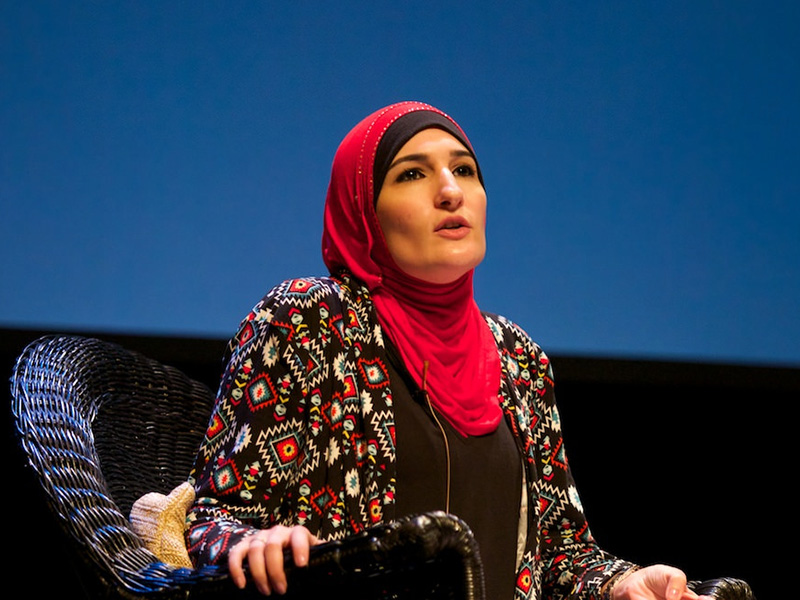Is it hypocritical for members of the Jewish community to attempt to prevent individuals who are purportedly “anti-Israel” from appearing at certain events, while, at the same time, decrying attempts by others to prevent pro-Israel speakers from appearing at other events?
The issue was brought into focus in Winnipeg recently, when Palestinian-American activist Linda Sarsour was invited to participate in a panel discussion about community organizing. In my newspaper, the Jewish Post & News, I tried to make the point that many other anti-Israel speakers have come to Winnipeg in the past, without anyone batting an eye. The list includes former British member of Parliament George Galloway, who, in my opinion, was far harsher in his denunciation of Israeli government policy than Sarsour has ever been.
Granted, Galloway – along with other noted anti-Israel speakers, such as Norman Finkelstein, Mordecai Briemberg and Michael Keefer – all appeared in Winnipeg prior to the social media age. Nonetheless, not one of them drew much attention at all, except from fringe media outlets. I would suggest that the same would have held with Sarsour, except that a couple of noisy individuals in our community who have taken it upon themselves to identify who is an enemy of Israel, began a social media campaign demanding that she be disinvited.
What was the result? Major Jewish organizations, notably Winnipeg’s Jewish Federation, along with B’nai Brith, joined in the hew and cry. Ultimately, Winnipeg’s own mayor, Brian Bowman, added his own voice to those calling for Sarsour to be shut out of the city. (Bowman was photographed standing with representatives of the Jewish Federation and B’nai Brith when he issued his statement.)
READ: SARSOUR SPARKS CONTROVERSY WITH WINNIPEG ENGAGEMENT
At Sarsour’s panel discussion, which I attended, there were three TV cameras. The next day, Sarsour was featured prominently in our two daily newspapers, along with a full range of reports on various radio stations and the three TV stations. It left me wondering: would she have attracted any attention at all had the campaign to disinvite her never been initiated?
Two months earlier, a similar campaign to disinvite someone also roiled Winnipeg’s Jewish community. Lex Rofeberg, a young rabbinical student, was disinvited from appearing at the Shaarey Zedek Synagogue when it was revealed that he is also associated with a group that’s critical of Israeli government policy.
When rioting protesters disrupted Benjamin Netanyahu’s speech at Concordia University in 2002 – and again two years later, when Ehud Barak was banned from the university – the Jewish community was shocked, and justifiably so.
More recently, there have been several instances of Israeli speakers either being shouted down, or being prevented from speaking, on American university campuses. In 2015, for example, former Israeli Supreme Court chief justice Aharon Barak, who’s noted for his support of Palestinian rights, had his talk at the University of California, Irvine interrupted and curtailed. The following month, world-renowned Israeli philosopher and New York University faculty member Moshe Halbertal’s lecture at the University of Minnesota was disrupted. Likewise, Arab-Israeli Bassem Eid was heckled by BDS activists at the University of Chicago and former Jerusalem mayor Nir Barkat was blocked from speaking at San Francisco State University.
And yet, when I put it to some of the anti-Sarsour faction that it was hypocritical to attempt to ban her from speaking, while, at the same time, insisting that pro-Israel speakers should have been allowed to talk, I was met with the retort: “How can you compare an Israeli prime minister with an anti-Semite?”
I don’t suppose that anything I might have to say about the subject will make one whit of difference to individuals who insist on keeping blinkers on when it comes to their hypocritical positions. But, for others who might have doubts about the inconsistency of wanting to have it both ways when it comes to suppressing opinions you may not like, all the while insisting that opinions you do like should be allowed to be heard – well, at least know that you’re not alone, as unpopular as that position may be these days within our Jewish community.
